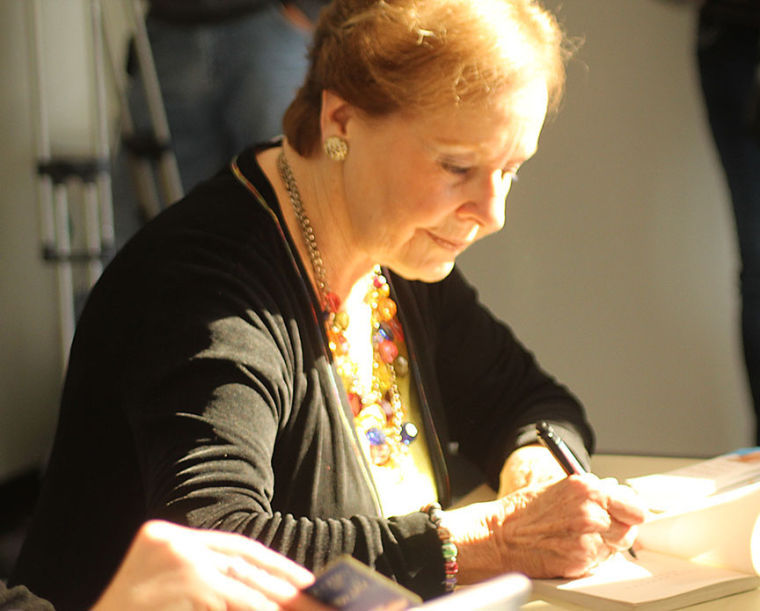Former captive shares Holocaust story
Marion Blumenthal Lazan signs copies of her book Four Perfect Pebbles: A Holocaust Story – a Message of Perseverance, Determination, Faith and Hope. She spoke about her experience in Corley Auditorium, Nov. 18.
Corley Auditorium was filled to capacity Monday morning as holocaust survivor Marion Blumenthal Lazan shared her firsthand account of the events that led her family into captivity at the hand of the Nazis during World War II.
The lecture was co-sponsored by the MSSU Social Sciences Department and the Institute of International Studies.
Lazan began her story at the point when she was about 4 years of age. The Blumenthal family had obtained permission and made arrangements to immigrate to America. In January 1939, the family traveled to Holland to wait for a number that would allow them to travel to the United States. They waited until December 1939, when they were deported to the detention camp of Westerbork to await their departure date. In May 1941, just one month before their scheduled departure, the Germans invaded Holland and the family was trapped.
Return to Germany
In January 1944 the Blumenthal family was transported to Bergen-Belsen, a concentration camp in Germany. Lazan was 9 years old. Fear and intimidation, along with vicious dogs, were tactics used by the German Army to instill fear in the people in line.
“To this day I still feel a certain sense of fear whenever I see a German shepherd,” she said.
The living conditions of the camps were every bit as awful as they have been depicted in movies and documentaries.
Six hundred Jews were crammed into barracks built to house 100. They remained in the camp for almost one and a half years.
“Our diets consisted of a slice of bread a day, a pat of butter, some hot watery soup with gristly meat … the bread was later cut back and given to us just once a week and only if our quarters were neat and in order,” said Lazan
Without water to wash daily, hygiene became a distant memory; however, opportunities to bathe, when they came, soon became an exercise in mental torture for the captives.
“Once a month we were marched to an area to shower, and there under the watchful eyes of the guards we were ordered to undress. We had heard about exterminations and gas chambers in other areas of Europe and we therefore were never sure when the faucets were turned on as to what would come out — water or gas,” she said.
Four Perfect Pebbles
Her book Four Perfect Pebbles: A Holocaust Story — A Message of Perseverance, Determination, Faith and Hope, was named for the game she played in the concentration camp.
“Much of my time was taken up with make-believe games. One game, a game based on superstition, became very important to me,” she said. “I decided that if I were to find four pebbles of about the same size and shape, that that would mean that the four members of my family would survive.”
Train to Freedom
Lazan’s family was loaded along with 2,500 other Jews on the last of three trains headed to Eastern Europe and the gas chambers in April 1945. The trip, which typically took 10 hours, lasted for more than two weeks as the Nazis attempted to evade the allies. Five hundred people died before the Russian Army liberated the train. She was 10 and 1/2 years old and weighed 35 pounds.
Her father succumbed to typhus just six weeks after their liberation. The remainder of the family gradually recuperated and returned to Holland and then on to the US. The family arrived in Hoboken, N.J., on April 23, 1948, exactly three years to the day after its liberation.
Lazan’s story is one of courage, perseverance, strength and determination to survive, which she says needs to be re-told to each new generation to ensure the horrific actions like those endured by this family are never repeated.
The presentation will air in its entirety on KGCS TV-22 on Monday, Nov. 25, at 7 p.m. and Tuesday, Nov. 26, at 9 p.m. A PBS documentary, Marion’s Triumph, will air again in April.
Your donation will support the student journalists of Missouri Southern State University. Your contribution will allow us to purchase equipment and cover our annual website hosting costs.




























